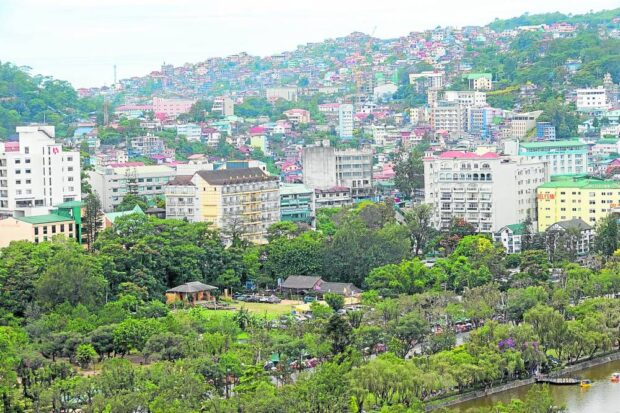Baguio projects to stay despite new PPP code

INVESTMENTS COMING Some of the country’s biggest developers are investing in big-ticket projects in Baguio, among these the rehabilitation of the public market and construction of a modern transport terminal, as the city grapples with problems owing to its rapid urbanization. —NEIL CLARK ONGCHANGCO
BAGUIO CITY — A new law has changed the rules for public-private partnership (PPP) projects that are designed to improve local economies in a postpandemic era.
But Republic Act No. 11966 (the new PPP Code of 2023) should not disrupt big-ticket Baguio projects that have undergone scrutiny and negotiations before the new law was enforced, Mayor Benjamin Magalong assured the city council on Thursday during its first special session for the year.
These projects include the modernization of the city’s century-old public market.
READ: Big-ticket road, transport systems eyed in Baguio
Magalong and the council deliberated on the impact of RA 11966 on seven unsolicited proposals worth over P22.6 billion from big developers like Megawide Construction Corp. and Metro Pacific Tollways Corp. that have either completed negotiations or were being reviewed before President Marcos signed the law on Dec. 5 last year. It took effect on Dec. 23.
The PPP Code unified the “fragmented” laws and procedures used by national and local governments and instituted a common system for validating private sector-financed public projects to make sure residents are not made to pay exorbitant fees for these new services.
All PPP projects must secure the approval of the city or municipal councils, said city legal officer Althea Alberto during the session, citing the new code. But unsolicited proposals must first be directed to the PPP center for preliminary review, she said.
The P4.5-billion multistory market building, which may be put up by SM Prime Holdings, and a P1.025 billion “intermodal terminal” proposed by Megawide are receiving certificates of successful negotiations following extensive talks to draw up their respective terms of reference, Alberto said.

REDEVELOPMENT Baguio City’s century-old public market may soon be replaced with a P4.5-billion commercial building if a public-private partnership deal pushes through this year. The market property is one of the city’s most expensive real properties. —VINCENT CABREZA
‘Competitive challenge’
This meant that both projects could be ready for a Swiss challenge (now called a “competitive challenge” under the new law). A Swiss challenge allows the city government to invite other companies to match or outbid the original proponents.
But the new law now requires Baguio to first transmit the two major projects to the City Development Council which would validate their feasibility, and secure the council’s approval before undergoing a competitive challenge, Alberto said.
Baguio, which began a series of redevelopment programs before the pandemic struck, has been processing unsolicited PPP proposals through a Public-Private-Partnership for the People (P4) committee that was formed by Ordinance No. 61 series of 2017.
RA 11966 has made both the ordinance law and the P4 committee inoperable as of Dec. 23, Magalong said.
According to Alberto, the task of the P4 committee will be assumed by a specialized bids and awards committee and a PCC unit that will oversee these projects.
Smart mobility
The P4 committee was in the middle of negotiations for the P11.6-billion elevated monorail and electric bus system pitched by Metro Renewable Transport Solutions (a subsidiary of Metro Global Holdings Inc.), according to Alberto.
It was also negotiating with Metro Pacific Tollways for a P2.53-billion “smart mobility” system to manage public transport and regulate road use to eliminate the need to drive to downtown Baguio.
The P810-million revival of Baguio’s American-era Asin hydroelectric power plants in neighboring Tuba town in Benguet was being discussed by the P4 committee and a new company, Renewable Energy Corp.
READ: Baguio creates ‘living streets’
P4 was also reviewing two new proposals that were accepted before Dec. 23—a P689-million pitch by All Asia Structures Inc. for a Baguio Central Terminal made up of a “mixed-use” building and a cultural center, and a P1.5-billion pitch from Schierman Construction Consolidated Inc. to put up a socialized housing and “permaculture community” at a property in Tuba, Benguet, bought by the city government. No details about these new projects were immediately available.
Councilor Peter Fianza, chair of the committee on laws, suggested that members of the council should not be part of the Prequalification, Bids and Awards Committee or units handling PPP projects given that the council has become an approving authority. Some councilors used to be members of the P4 committee.
But according to Magalong, councilors may still be appointed as observers or as nonvoting members of these new bodies to ensure full transparency. Fianza joined a Dec. 22 meeting between the PPP Center, Magalong and Alberto to discuss the fate of Baguio’s multibillion-peso projects.